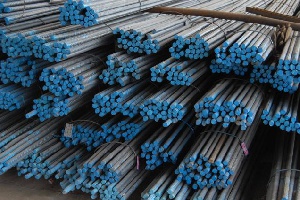Ghana’s steel manufacturing industry is to receive a major boost with the establishment of wire coils and sections manufacturing plant at Tema, to serve both the local market and the West African sub-region.
The plant, a phase two project of Sentuo Steel Limited, costing about 53 million dollars, is expected to add 500,000 metric tonnes annually to the company’s existing 300,000 metric tonnes annual production capacity.
The amount was raised from the shareholders of Sentuo: Fugian Overseas Chinese Industrial Group Corporation (FOCIGC) which owns a 74 per cent shares and the Social Security and National Insurance Trust (SSNIT), with 26 per cent shares.
Mr. Ningqian Xu, Managing Director of Sentuo Steel Limited, told newsmen during a visit to its plant at the Tema Heavy Industrial Area, as part of a media tour, organised by the Chinese Embassy in Ghana.
Mr Xu explained that the media tour was to highlight Chinese investments in Ghana over the past 55 years of bilateral relations, and said the phase two project would be completed in about two months’ time.
Mr Xu noted that the plant, expected to be completed in two months, would be the only one in the West African sub-region for the manufacture of products such as wire coils and sections like square pipe, steel round pipe and angle steel, among others.
He said Sentuo was fully poised to take advantage of emerging opportunities and challenges, while providing high-quality steel products and services to meet demand on the West African market.
Sentuo steel currently manufactures reinforced iron rods for the Ghanaian market. With an annual installed capacity of 300,000 metric tonnes, the plant currently produces only about 40 per cent of that capacity, due to unavailability of enough ferrous scrap metal, its main raw material for production.
Mr. Xu said the company could not produce at full capacity because it could not get enough scrap metal, in spite of the ban on exportation of scrap metal, and has had to import some from countries such as Mali and Kenya.
Asked how it would feed its production in the second phase to produce enough for both the Ghanaian and West African markets, Mr. Xu said they would import steel billets from Europe and America.
He explained that this would not increase the prices of the finished products, since the cost of importing the raw material was cheaper that buying the scrap from local scrap dealers.
He reiterated the company’s commitment to Ghana, saying; “Ghana and China have a long-standing relations, one of friendship and brotherliness," noting that Sentuo was interested first in supporting the local manufacturing industry in Ghana, despite current challenges in the economy.
Mr. Emmanuel Ayansu, General Manager and Consultant at Sentuo Steel, called on government to prefer value addition to fundamental raw materials, and do more to support companies that undertook such work.
He said in line with the company’s commitment to knowledge and skill transfer, Sentuo Steel’s Chinese investors were thinking of instituting a scholarship programme for Ghanaian employees to under-study the parent company in China.
He said the plant currently employs about 600 people, including 127 foreigners, and hoped to double the number when the second phase became operational.
Business News of Thursday, 4 June 2015
Source: GNA
Ghana’s Steel Industry to receive major boost
Entertainment












